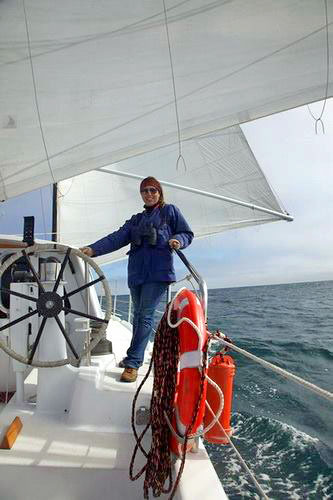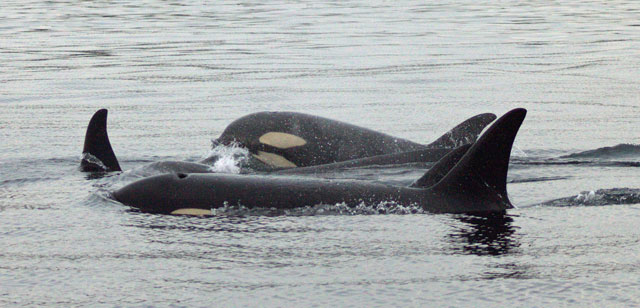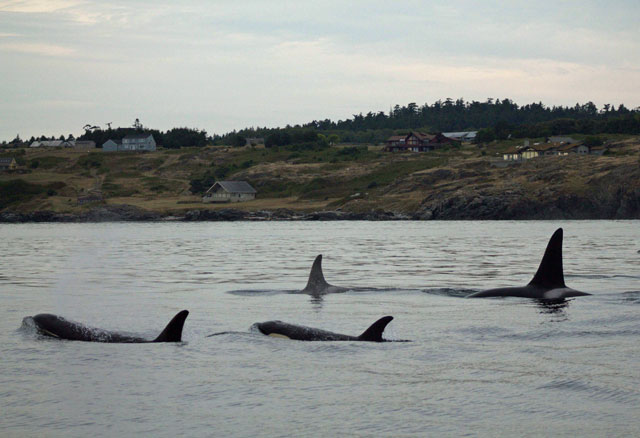Presented by Jodi Smith, Founder and Executive Director of Naked Whale Research (NaWhaRe), this lecture will cover an unusual Killer Whale incident.
 In 1997, Bremerton, Washington locals woke up to find 19 fish-eating killer whales in their small backyard inlet. Long-time researchers quickly determined that the whales were fine and would likely leave after one week. What ensued, however, was a 30-day struggle to understand why the whales stayed within the inlet, attempts at protecting them from the public at large, and the story of how a novice whale biologist helped finally escort them out. Her lecture will focus on how this 30-day encounter helped launch Smith into the field of behavioral biology and her studies on how tourism can impact the survival rate of whales and dolphins.
In 1997, Bremerton, Washington locals woke up to find 19 fish-eating killer whales in their small backyard inlet. Long-time researchers quickly determined that the whales were fine and would likely leave after one week. What ensued, however, was a 30-day struggle to understand why the whales stayed within the inlet, attempts at protecting them from the public at large, and the story of how a novice whale biologist helped finally escort them out. Her lecture will focus on how this 30-day encounter helped launch Smith into the field of behavioral biology and her studies on how tourism can impact the survival rate of whales and dolphins.
 NaWhaRe specializes in the behavioral biology of rare and endangered killer whales. A worldwide species, there are three known killer whale ecotypes. Some pods are marine mammal eaters and others are offshore specializing in preying upon nine different shark species. The third category, resident or fish-eating pods, are the focus of her studies, particularly the 80 individuals comprising the J, K, and L pods that live part of the year in Puget Sound near the San Juan Islands of Washington State and part of the year off the Northern California coast as far south as Monterey Bay.
NaWhaRe specializes in the behavioral biology of rare and endangered killer whales. A worldwide species, there are three known killer whale ecotypes. Some pods are marine mammal eaters and others are offshore specializing in preying upon nine different shark species. The third category, resident or fish-eating pods, are the focus of her studies, particularly the 80 individuals comprising the J, K, and L pods that live part of the year in Puget Sound near the San Juan Islands of Washington State and part of the year off the Northern California coast as far south as Monterey Bay.
The mission of NaWhaRe is to create public awareness as to the threats of the long term survival of the Northern California killer whales frequenting Mendonoma coastal waters. Current concerns can be broadly defined as environmental contamination, reduction in availability of prey, and both physical and acoustic human disturbances. As part of her research Smith relies on volunteers to observe and report sightings.
She is currently working on a project to listen in on whale conversations through underwater microphones placed at strategic locations along the coast. Recent grant funding will allow the first hydrophone node to be placed off the Point Arena lighthouse this spring. Once in place, live acoustics will be uploaded to the internet and anyone can hear the whales communicating through the NaWhaRe web page connection.
A native Californian, Smith was born in Bakersfield and raised in the small Sierra Nevada community of Plumas County. Smith has spent the past 20 years in the field of cetology studying whales and dolphins around the world. After completing her Master of Science degree at Massey University in Auckland, New Zealand, in 2009, she came back to Northern California and founded the nonprofit research organization she now heads. The past three years she has been on a NOAA aerial survey contract assessing populations off the Eastern coastline between New Jersey and Florida. She is also a monthly regular on KGUA’s radio show “Peggy’s Place.”
 Gualala Arts Promoting public interest and participation in the arts since 1961
Gualala Arts Promoting public interest and participation in the arts since 1961

